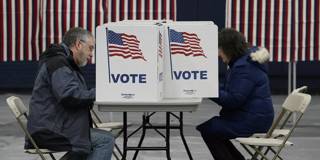If Donald Trump wins back the White House in November, this year could mark a turning point for American power. Finally, the fear of decline that has preoccupied Americans since the colonial era would be justified.
CAMBRIDGE – With most Americans believing that the United States is in decline, Donald Trump claims he can “Make America Great Again.” But Trump’s premise is simply wrong, and it is his proposed remedies that pose the biggest threat to America.
Americans have a long history of worrying about decline. Shortly after the founding of the Massachusetts Bay colony in the seventeenth century, some Puritans lamented the loss of an earlier virtue. In the eighteenth century, the founding fathers studied Roman history when considering how to sustain a new American republic. In the nineteenth century, Charles Dickens observed that if Americans are to be believed, their country “always is depressed, and always is stagnated, and always is at an alarming crisis, and never was otherwise.” On a 1979 magazine cover about national decline, the Statue of Liberty has a tear rolling down her cheek.
But while Americans have long been drawn to what I call the “golden glow of the past,” the US has never had the power many imagine it did. Even with preponderant resources, America has often failed to get what it wants. Those who think that today’s world is more complex and tumultuous than in the past should remember a year like 1956, when the US was unable to prevent Soviet repression of a revolt in Hungary; and when our allies Britain, France, and Israel invaded the Suez. To paraphrase the comedian Will Rogers, “hegemony ain’t what it used to be and never was.” Periods of “declinism” tell us more about popular psychology than about geopolitics.

CAMBRIDGE – With most Americans believing that the United States is in decline, Donald Trump claims he can “Make America Great Again.” But Trump’s premise is simply wrong, and it is his proposed remedies that pose the biggest threat to America.
Americans have a long history of worrying about decline. Shortly after the founding of the Massachusetts Bay colony in the seventeenth century, some Puritans lamented the loss of an earlier virtue. In the eighteenth century, the founding fathers studied Roman history when considering how to sustain a new American republic. In the nineteenth century, Charles Dickens observed that if Americans are to be believed, their country “always is depressed, and always is stagnated, and always is at an alarming crisis, and never was otherwise.” On a 1979 magazine cover about national decline, the Statue of Liberty has a tear rolling down her cheek.
But while Americans have long been drawn to what I call the “golden glow of the past,” the US has never had the power many imagine it did. Even with preponderant resources, America has often failed to get what it wants. Those who think that today’s world is more complex and tumultuous than in the past should remember a year like 1956, when the US was unable to prevent Soviet repression of a revolt in Hungary; and when our allies Britain, France, and Israel invaded the Suez. To paraphrase the comedian Will Rogers, “hegemony ain’t what it used to be and never was.” Periods of “declinism” tell us more about popular psychology than about geopolitics.